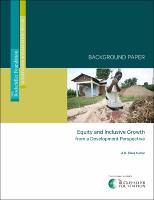| dc.description.abstract | Dr. A.K. Shiva Kumar wrote Equity and Inclusive Growth from a Development Perspective to supplement a series of workshops with Rockefeller Foundation staff in 2012 and 2013. The paper has since become the “go-to” source for knowledge about development concepts that are important to designing, implementing, monitoring, and evaluating the work of the Foundation.
The paper establishes why growth is important and surveys the history of growth theories from the 1950s to the present. This includes approaches to growth such as equitable growth, pro-poor growth, and inclusive growth. The paper reviews the argument against the use of GDP as a measure of well-being and sets out a range of alternatives that embrace a human development approach to measurement.
Conceptually, “poverty” covers an array of impoverished states, including income poverty, non-monetary poverty, ill-being, and capability deprivation. Each also requires different measures, the range of which are explained in this paper.
While “equality” is a frequent goal in development programs, Dr. Kumar argues that the focus should be on equality of opportunity, and equity—the fair distribution of the benefits—of development intent. The paper describes the existing measures of inequality as well as the policy implications for the pursuit of equity. | |

